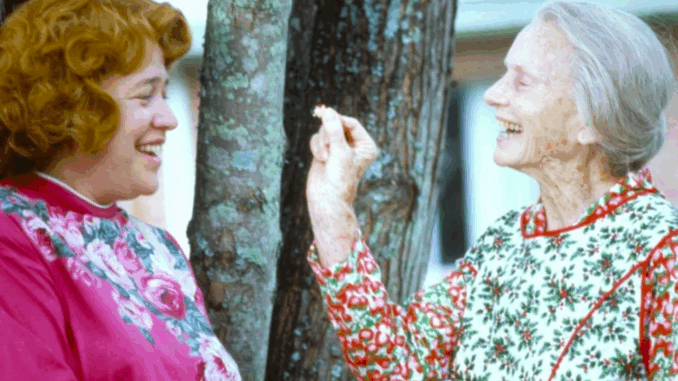
When Fried Green Tomatoes arrived in theaters in 1991, audiences quickly realized it wasn’t just another Southern melodrama. At its core, the film was a celebration of women — their friendships, their resilience, and the quiet revolutions they lead in everyday life. Long before Hollywood coined the term “strong female character,” this story, adapted from Fannie Flagg’s novel, gave audiences a spectrum of complex women who challenged expectations and redefined what empowerment could look like on screen.
Evelyn Couch: The Awakening of an Ordinary Woman
For many viewers, the character who resonated most deeply was Evelyn Couch, played with warmth and vulnerability by Kathy Bates. At the start of the film, Evelyn is timid, stuck in a marriage where she feels invisible, and constantly told she isn’t enough. Her weekly visits to a nursing home — where she meets the sharp-witted Ninny Threadgoode — become an unlikely lifeline.
Through Ninny’s stories, Evelyn finds herself transformed. She begins to confront her fears, assert her voice, and embrace her independence. By the end of the film, she’s smashing car windows in a grocery store parking lot, a cathartic symbol of rebellion against decades of quiet repression. Evelyn’s journey was a revelation for audiences, particularly women who recognized their own struggles in her arc.
Idgie and Ruth: A Partnership Beyond Labels
The heartbeat of Fried Green Tomatoes is the bond between Idgie Threadgoode (Mary Stuart Masterson) and Ruth Jamison (Mary-Louise Parker). Their partnership, forged through grief, loyalty, and shared determination, is portrayed as both practical and deeply emotional. Together, they run the Whistle Stop Café, creating a community hub that offers food, shelter, and a sense of belonging to anyone who walks through the door.
Hollywood’s decision to sidestep the explicitly romantic undertones of their relationship sparked debate — and, to this day, many argue that the film erased an important queer love story. Yet even within those limitations, Masterson and Parker imbued their performances with tenderness and passion, ensuring that Idgie and Ruth’s bond transcended easy categorization. Their connection remains one of the most enduring depictions of chosen family and female solidarity in American cinema.
Ninny Threadgoode: The Keeper of Stories
At 82, Jessica Tandy played Ninny Threadgoode with twinkling eyes and sharp wit, a reminder that older women are often the bearers of wisdom overlooked by society. Ninny is the one who hands Evelyn the keys to her transformation, simply by sharing stories of courage and defiance from decades past.
Through Ninny, the film highlights the power of storytelling itself as an act of empowerment. Her tales of Idgie and Ruth bridge generations, proving that the lives of women — often dismissed as domestic or ordinary — are worthy of being remembered, honored, and passed down.
Female Empowerment in the Southern Gothic Tradition
Set against the backdrop of the American South, Fried Green Tomatoes uses its regional setting not just for atmosphere but as a stage for rebellion. In a time and place where women were expected to remain silent, submissive, and confined to traditional roles, the women of Whistle Stop carved out their own space of autonomy.
Running a café during the Great Depression was no small feat. Standing up to abusive men, corrupt authorities, and the prejudice of the era required courage. The film portrays these acts not as grand gestures but as everyday choices — the quiet insistence on dignity, kindness, and community.
Resonance Across Generations
What made Fried Green Tomatoes radical for its time was the breadth of its female representation. It showed women in their twenties, forties, and eighties — all navigating identity, love, loss, and purpose. It offered audiences a rare depiction of intergenerational connection, where wisdom flowed both ways and empowerment was shared.
The film also broke Hollywood’s unwritten rules by refusing to center men. Male characters exist — some kind, some cruel — but they are never the axis around which the story spins. Instead, women drive the narrative, make the decisions, and carry the emotional heart of the film.
A Legacy of Representation
Decades later, audiences continue to revisit Fried Green Tomatoes not just for its nostalgia but for its relevance. Conversations about gender, aging, and representation remain urgent in Hollywood. Evelyn’s quest for self-worth echoes in contemporary movements for women’s empowerment. Idgie and Ruth’s partnership continues to inspire LGBTQ+ viewers who see themselves reflected, however imperfectly, on screen.
More than anything, the film reminds us that empowerment doesn’t always look like revolution from the outside. Sometimes it looks like a woman finding her voice, a friendship that defies convention, or a story passed from one generation to the next.
And that, perhaps, is the quiet genius of Fried Green Tomatoes: it insisted that the lives of women — ordinary, extraordinary, messy, and real — are stories worth telling.
